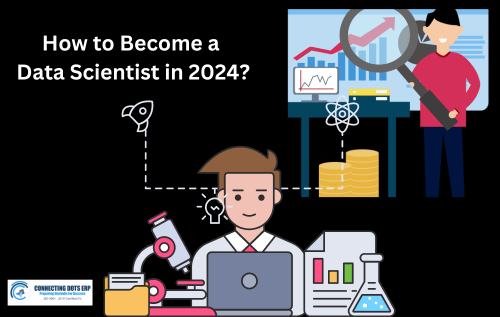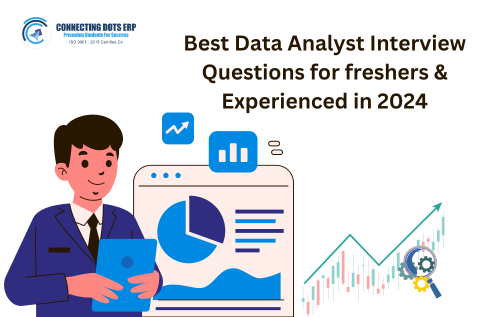Best Data Analyst Interview Questions for freshers & Experienced in 2024
A Data Analyst is a professional who interprets and analyzes complex data sets to extract valuable insights. Through a Data Analyst course in Pune, you can gain the skills necessary to utilize statistical techniques and programming expertise to examine trends, patterns, and correlations within data, aiding in informed decision-making. Data Analyst training equips you to clean and organize data, create visualizations, and generate reports to communicate findings effectively.
This Data Analyst course is designed to serve various industries, helping businesses understand customer behavior, optimize operations, and enhance overall performance. With proficiency in tools like Excel, SQL, and Python, a Data Analyst plays a crucial role in transforming raw data into actionable information, facilitating strategic planning and problem-solving for organizations.
Empower yourself for success with our Data Analyst training in Pune. This advance guide, tailored for experienced professionals, offers valuable insights into frequently encountered interview questions and provides strategic response frameworks. Navigate various interview scenarios with confidence using our expert guidance. This resource is your key to impressing hiring managers and securing your desired Data Analyst position.
Question: What does a Data analyst do?
Answer: A Data analyst is responsible for collecting, organizing, and analysing large sets of data to extract meaningful insights and patterns. They use various tools and techniques to clean, transform, and validate data, and then apply statistical and analytical methods to interpret the data. Data analysts often create reports, dashboards, and visualizations to present their findings, helping businesses make informed decisions and identify areas for improvement.
Question: What is Data Cleansing?
Answer: Data cleansing, also known as data cleaning, is the process of identifying and correcting errors, inconsistencies, and inaccuracies in a dataset. It involves handling missing values, removing duplicate entries, correcting syntax errors, and resolving any discrepancies to ensure that the data is accurate and reliable for analysis.
Question: What do you mean by Data Visualization?
Answer: Data visualization refers to the graphical representation of data and information. It involves using charts, graphs, plots, and other visual elements to present complex data in a more intuitive and easy-to-understand manner. Data visualization helps analysts and stakeholders gain insights quickly and make informed decisions based on the patterns and trends identified in the data.
To Learn more about the topic click here
Question: What is the difference between Data Analysis and Data Mining?
Answer: Data analysis involves examining, cleaning, transforming, and interpreting data to identify patterns, draw conclusions, and support decision-making. It is a broader term that encompasses various techniques and methods used to explore data.
On the other hand, data mining specifically refers to the process of discovering meaningful patterns and relationships in large datasets using machine learning algorithms and statistical methods. Data mining focuses on uncovering hidden insights and knowledge from the data that might not be immediately apparent.
Question: Which Programming Language do you use for Data Analyst?
Answer: Data analysts commonly use programming languages such as Python, R, SQL, and sometimes tools like Excel for data analysis tasks.
Question: What do you mean by Data Cleaning?
Answer: Data cleaning, also known as data cleansing, is the process of identifying and correcting errors, inconsistencies, and inaccuracies in a dataset. It involves handling missing values, removing duplicate entries, correcting syntax errors, and resolving any discrepancies to ensure that the data is accurate and reliable for analysis.
To Learn more about the topic click here
Question: Can you define: Data Profiling, Clustering, and KNN imputation method?
Answer:
Data Profiling: It is the process of examining and analysing data to understand its structure, quality, and content. It involves gathering metadata, summary statistics, and data patterns to assess the overall data quality and identify potential issues.
Clustering: It is a data analysis technique used to group similar data points together based on certain features or characteristics. The goal of clustering is to find patterns and relationships within the data and segment it into distinct groups.
KNN imputation method: KNN (K-Nearest Neighbors) imputation method is a data imputation technique used to fill in missing values in a dataset. It predicts the missing values based on the values of the nearest neighbors (existing data points) in the feature space.
Question: Can you define: Data wrangling, Outlier, and N-grams?
Answer:
Data wrangling: Data wrangling, also known as data munging, is the process of gathering, cleaning, transforming, and structuring raw data from different sources into a format suitable for analysis. It involves dealing with data inconsistencies, merging datasets, and reshaping data for analysis.
Outlier: An outlier is an observation in a dataset that significantly deviates from the rest of the data. Outliers can be caused by measurement errors, data entry mistakes, or genuine anomalies in the data. They can have a significant impact on data analysis and need to be handled appropriately.
N-grams: N-grams are contiguous sequences of N items or words in a text. In the context of natural language processing, N-grams are used to analyse and model language patterns, such as word frequency and sentence structure.
To Learn more about the topic click here
Question: What data analytics software/ Programming Languages / Tools are you trained in?
Answer: Data analytics software/Programming Languages/Tools I am trained in:
Some commonly used data analytics tools and languages. Some of the popular data analytics software and programming languages include Python (with libraries like Pandas, NumPy, and scikit-learn), R, SQL, Excel, Tableau, Power BI, and Apache Spark.
Question: Do you have basic statistical knowledge? or What is your statistical knowledge for data analysis?
Answer: I have knowledge of basic statistical measures such as mean, median, and standard deviation, as well as various hypothesis tests, regression analysis, and probability distributions. I can assist with statistical calculations, explain statistical concepts, and guide users through data analysis processes. However, for complex or specialized statistical analyses, it is recommended to consult with a domain expert or a dedicated statistical software package.
Question: Which skills and qualities make a good data analyst?
Answer:
Skills and qualities that make a good data analyst:
- Strong analytical and problem-solving skills.
- Proficiency in data manipulation and analysis using programming languages like Python or R.
- Knowledge of statistical methods and techniques.
- Familiarity with data visualization tools to present insights effectively.
- Domain knowledge to understand the context and interpret the data correctly.
- Attention to detail for data cleaning and validation.
- Effective communication skills to convey findings to non-technical stakeholders.
- Curiosity and a proactive attitude to explore and discover patterns in the data.
- Ability to work with large datasets and databases.
- Knowledge of machine learning and data mining techniques is a plus.
Question: Suppose you are given some employees or students dataset. How do you sort this data. and What do you do for data preparation? And What is the basic process of Data Analysis?
Sample Answer: If I am given a dataset of employees or students, the first step would be to understand the structure and content of the data. After that, I would follow these steps for sorting the data and data preparation:
Sorting the Data:
Sorting the data can be done based on one or more columns in the dataset. For example, if the dataset contains an “ID” column, I can sort the data in ascending or descending order based on the “ID” to organize it systematically.
Data Preparation:
Data preparation is a crucial step in the data analysis process. It involves cleaning and transforming the data to make it suitable for analysis. Here are the main data preparation steps:
- Handling Missing Values: Identify and handle any missing values in the dataset. This can involve filling in missing values using imputation techniques or removing rows or columns with missing data.
- Removing Duplicates: Check for and remove any duplicate entries in the dataset to avoid duplication bias.
- Data Transformation: Convert data into the appropriate format for analysis. This includes converting data types, encoding categorical variables, and creating new features if needed.
- Data Scaling/Normalization: If the dataset contains numerical variables with different scales, it may be necessary to normalize or scale the data to ensure fair comparisons during analysis.
- Feature Selection: Choose relevant features or columns for analysis, excluding any irrelevant or redundant ones.
- Handling Outliers: Identify and handle outliers that may significantly affect the analysis. Outliers can be removed or transformed based on the nature of the data and the analysis goal.
- Data Integration: If multiple datasets need to be used together, integrate them into a single cohesive dataset.
- Data Splitting: If applicable, split the dataset into training and testing sets for machine learning tasks.
Basic Process of Data Analysis:
The basic process of data analysis typically includes the following steps:
- Data Exploration: Perform exploratory data analysis (EDA) to understand the characteristics of the data, examine distributions, detect patterns, and explore relationships between variables. This step often involves generating summary statistics and data visualizations.
- Data Cleaning and Preparation: As described above, clean and prepare the data for analysis by handling missing values, duplicates, and outliers, and transforming the data into a usable format.
- Data Analysis Techniques: Apply appropriate data analysis techniques such as statistical analysis, data modeling, machine learning, or other methods depending on the analysis goals.
- Interpretation of Results: Analyze the results obtained from the data analysis techniques and interpret the findings in the context of the original problem or research question.
- Drawing Insights: Use the results and insights gained from the data analysis to draw meaningful conclusions and make data-driven recommendations or decisions.
- Data Visualization and Reporting: Create visualizations (charts, graphs, etc.) to communicate the findings effectively to stakeholders. Prepare reports or presentations summarizing the analysis process and its outcomes.
To Learn more about the topic click here
Question: Suppose you are asked to design an experiment to test the effectiveness of a new marketing campaign. What would be your experimental design?
Sample Answer: For testing the new marketing campaign, I would create two groups – the control group (without exposure to the campaign) and the experimental group (exposed to the campaign). Randomly assign individuals to each group and measure the campaign’s impact on key metrics like sales or customer engagement.
Question: You are presented with a set of data that shows a correlation between two variables. How would you determine if this correlation is statistically significant?
Sample Answer: To determine if the correlation between two variables is statistically significant, I would conduct a statistical test like Pearson correlation coefficient or Spearman rank correlation. Evaluate the resulting p-value, and if it is below a predetermined significance level (e.g., 0.05), the correlation is considered statistically significant.
Question: Suppose you are asked to build a predictive model to predict customer lifetime value. What factors would you include in the model?
Sample Answer: In the predictive model for customer lifetime value, I would include factors such as customer purchase history, frequency of purchases, average order value, customer demographics, customer engagement metrics, and customer churn rate.
To Learn more about the topic click here
Question: Suppose you are given a dataset with missing values. How would you handle them?
Sample Answer: To deal with missing values in the dataset, I would consider methods such as imputation (mean, median, or regression-based imputation), removing rows or columns with missing data, or using advanced techniques like KNN imputation to fill in missing values based on similar data points.
Question: You are asked to create a dashboard to track the performance of a marketing campaign. What metrics would you include?
Sample Answer: The dashboard would include metrics like conversion rate, click-through rate (CTR), customer acquisition cost (CAC), return on investment (ROI), and customer lifetime value (CLV) to track the overall performance and effectiveness of the marketing campaign.
Question: You are presented with a dataset containing financial transactions and customer information. The company suspects fraudulent activities in their transactions. How would you use data analysis and visualization to detect anomalies and potential fraud patterns? -short answer only
Sample Answer: In data analysis, I would first perform exploratory data analysis (EDA) to identify patterns and potential outliers. Then, I would use statistical techniques and machine learning algorithms such as anomaly detection (e.g., Isolation Forest, Local Outlier Factor) to flag unusual transactions. Data visualization would help in visually inspecting transaction patterns and highlighting suspicious activities for further investigation.
Question: You are given access to a database containing employee data, including performance metrics and demographics. The HR department wants to understand the factors that contribute to employee turnover. What steps would you take to analyse the data and draw meaningful conclusions?
Sample Answer:
I would follow these steps:
Data Cleaning: Begin by cleaning the data to handle missing values and remove duplicates, ensuring data integrity.
Exploratory Data Analysis (EDA): Conduct EDA to understand the distribution of employee turnover, identify patterns, and explore relationships between performance metrics and demographics.
Feature Selection: Select relevant features that may impact turnover, such as job satisfaction, tenure, salary, and performance ratings.
Statistical Analysis: Apply statistical methods (e.g., t-tests, chi-square tests) to assess the significance of the selected features on turnover.
Machine Learning: Employ predictive modelling (e.g., logistic regression, decision trees) to build a model that can predict turnover based on the identified factors.
Interpretation: Analyse the model results to draw insights into the main drivers of employee turnover and provide actionable recommendations to the HR department.
Question: A company is planning to launch a new product in the market and wants to identify the target audience. How would you analyse demographic and customer preference data to recommend the most suitable target market for the product?
Sample Answer:
I would follow these steps:
Data Collection: Gather demographic data and customer preference information through surveys, market research, or online sources.
Data Cleaning: Cleanse and preprocess the data to handle missing values and ensure data quality.
Exploratory Data Analysis (EDA): Analyse the demographic data and customer preferences to identify patterns and correlations.
Segmentation: Use clustering techniques (e.g., K-means) to group customers based on similar characteristics and preferences.
Target Market Identification: Analyse the clusters to identify segments with the highest potential interest in the new product, which will serve as the most suitable target audience for the product launch.
Question: You are given a dataset containing sales information for a company’s products over the past year. The management wants to know which product performed the best in terms of revenue. How would you approach this analysis, and what specific metrics or visualizations would you use to present your findings?
Sample Answer:
I would follow these steps:
Data Preparation: Clean and organize the sales data, handling any missing values or inconsistencies.
Revenue Calculation: Calculate the total revenue for each product by multiplying the unit price with the quantity sold.
Analysis: Compare the revenue generated by each product to identify the top-performing one.
Visualization: Create a bar chart or a pie chart to visually represent the revenue contribution of each product, making it easier for the management to identify the best-performing product at a glance.
Conclusion:
In conclusion, mastering the role of a Data Analyst requires a deep understanding of various analytical techniques, tools, and programming languages. Whether you are a fresher or an experienced professional, it is crucial to be well-prepared for interviews by familiarizing yourself with key concepts such as data cleaning, visualization, statistical analysis, and machine learning. Through a advance Data Analyst course in Pune, you can acquire the necessary skills to excel in this field and confidently navigate the challenges of a data analyst interview. With the right training and preparation, you can secure your desired position and contribute significantly to any organization by turning raw data into valuable insights.





